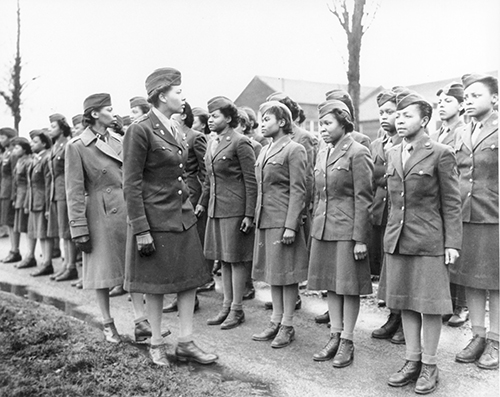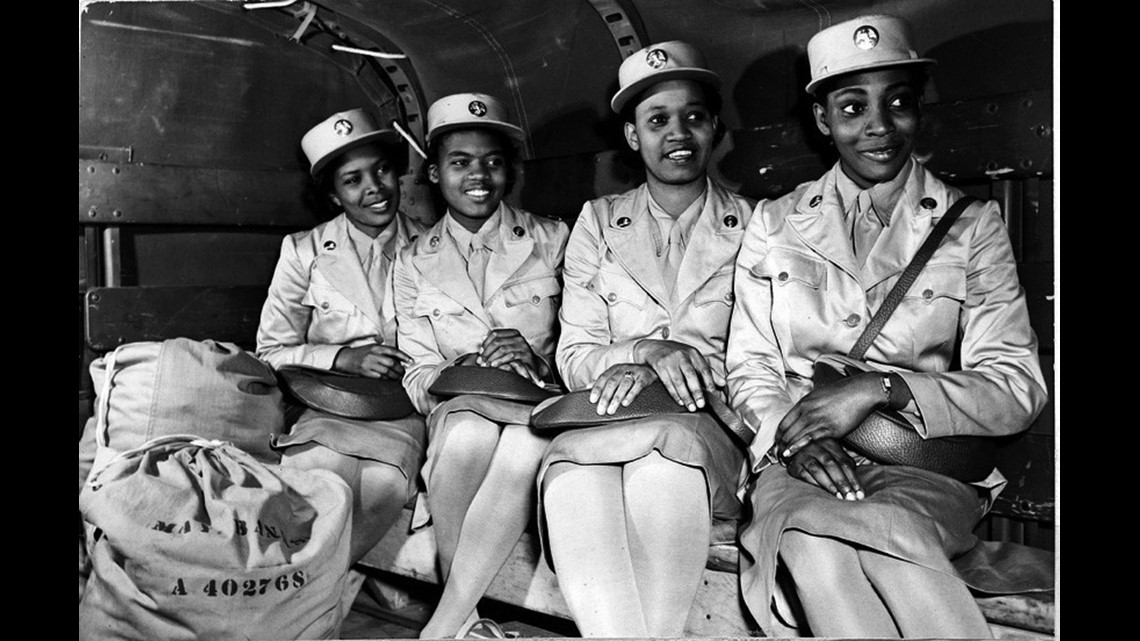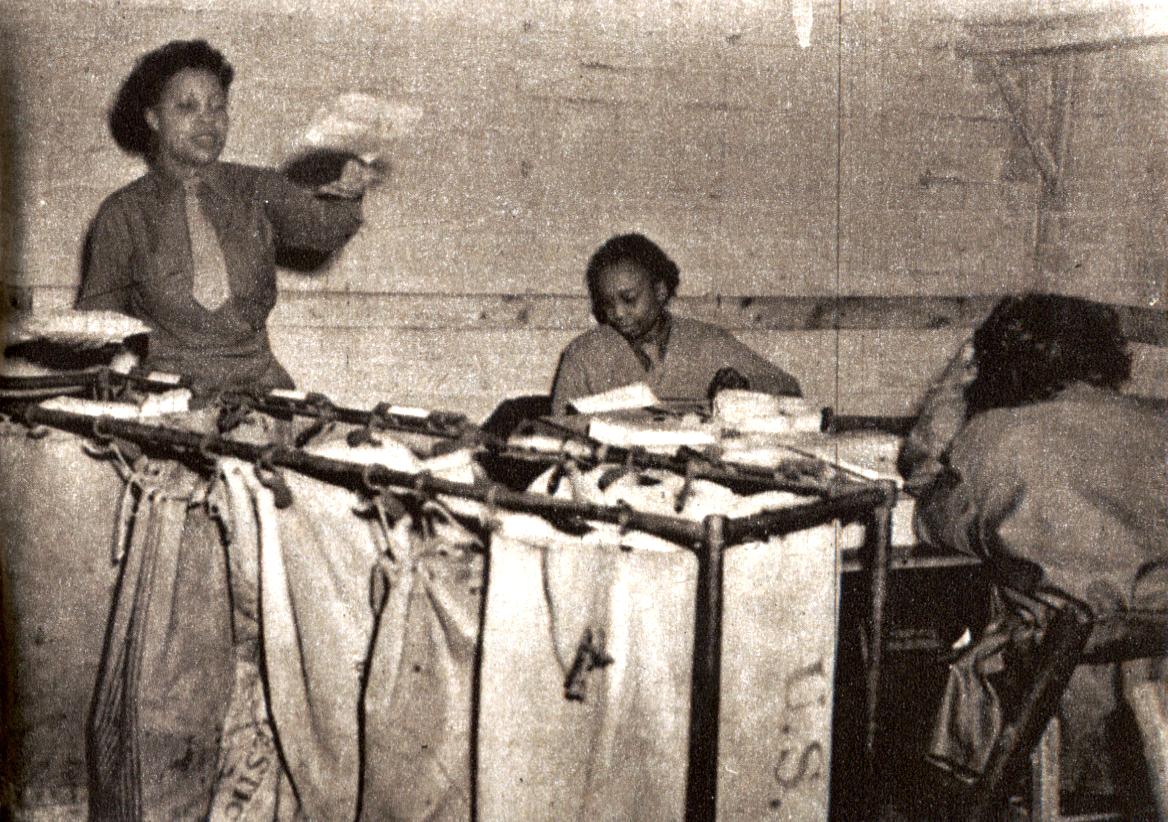
Good Morning POU!
Today we honor the women of the 6888th Central Postal Battalion.

Maj. Charity Adams, the 6888th’s commander, and Capt. Abbie Campbell inspect the troops upon their arrival in England, Feb. 15, 1945.
During the war, nearly 1,000 women from the “Six-Triple Eight” Central Postal Battalion moved mountains of mail for millions of American service members and civilians that clogged warehouses in England and France.
Their service to their country had been overlooked for years, starting with when they returned to the United States from assignments overseas.
“There was no parade,” said Mary Crawford Ragland. “We just came home.”
The 82-year old was among those gathered in February 2009 at the Women’s Memorial at Arlington National Cemetery, where a U.S. Army support group called the Freedom Team Salute presented them with certificates of appreciation, timed with Black History Month. The 6888th was the only all African-American, all female unit to serve overseas.
The group was given a letter of appreciation signed by the Army Chief of Staff and the Secretary of the Army, an Army lapel pin and an Army decal.
For Alyce Dixon, 101, it was worth the wait. “They asked me because I’m one of the oldest survivors, and I can still talk,” she said with a smile.

Nearly 800 women that were part of the 6888th were first stationed in Birmingham, England, for three months, moved to Rouen, France, and finally settled in Paris, according to the Army’s Web site.
The women of the 6888th Battalion survived two anxious brushes with the German military during World War II. First, German U-boats forced the unit’s convoy to reroute during its voyage across the Atlantic Ocean. Then, upon arriving in England a V1 rocket, known as a Buzz Bomb, came roaring into the area.
“Everyone was running,” recalled Mrs. Mary Ragland, a veteran of the unit, about the Buzz Bomb attack in February 1945, where the snow-saturated ground made running difficult. Alyce Dixon remembered, “I was little and I could get down.” No one was hurt in the attack, but the rocket got their attention: “I was always ready to run,” said Ragland. The U-boats had a similar effect: “Darn tootin’ I was scared!” admitted Ragland. The worst part was being in the middle of a vast ocean: “You can’t see land anywhere.”
They were responsible for redirecting mail to more than seven million people — all U.S. Armed Forces in the European Theater of Operations, including Army, Navy, Marine Corps, civilians and Red Cross workers.
As Army units quickly moved throughout Western Europe and into Germany, a massive mail snag occurred because of a manpower shortage.
Soldiers continued to move, fighting battles across the continent, but weren’t getting their mail. Morale began to drop.
That’s when the Army turned to the “Six-Triple-Eight”.

When Dixon and the other women arrived at a warehouse in early 1945, they found the building had no heat.
Inside the warehouse, the windows were painted black to keep the light from coming out at night against bombing raids. Because there was no heat, the women donned long johns and anything else they could layer on.
But the temperature was nothing compared with the daunting challenge of sorting the mail.
When they walked inside the warehouse, it was stacked to the ceiling with undelivered packages and letters.
“They had 90 billion pieces of mail,” Dixon told CNN, some of it from hometown friends and family addressed only to “Junior, U.S. Army or Buster, U.S. Army,” she said.
“We had to figure it out,” she said.
There were 7,500 soldiers named Robert Smith in the European Theater of Operations, according to the Museum of Black WWII History Web site, and the women had to keep them straight. Even when there were complete names, it wasn’t easy.
Because all undeliverable mail passed through them, they were charged with keeping information cards on everyone in the European Theater of Operations, according to the Army site. Because frontline soldiers were often moved frequently, the women often had to update information several times a month.
While it was an arduous task, the women knew the importance of their job. For soldiers in the field, letters from loved ones brought important personal connections that kept their morale going.
So they kept on sorting.

The women developed a system of Army Post Office boxes to pitch mail. For Soldiers with common surnames, like “Smith” or “Jackson,” the clerks used special locator cards that contained Soldiers’ names and unit numbers to ensure proper delivery. They repackaged damaged goods and sent them along. To deal with the volume of mail, the women worked seven days a week in eight-hour rotating shifts, with two groups pitching mail, while the third rested.
The women got to know the locals. “They treated us better than we were back home,” said Ragland. Carter remembered the smell of lilacs planted in the local yards. “Local women would bring us flowers, and ever since then I love the smell of lilacs.”
But some of their worst treatment came at the hands of their fellow countrymen. When an American general visited the unit, MAJ Charity Adams, the 6888th’s commander, ordered her two on-duty groups to fall out for inspection. The general was displeased that the whole unit was not present and threatened Adams that he would replace her with a white lieutenant. “Over my dead body,” Adams snapped. The women were behind her. “If they court-martialed her, they would have to court-martial 800 women,” said Carter. Fortunately, the general realized his mistake and apologized to Adams.
It was not the only time the WACs faced prejudice. When the Red Cross opened a club exclusively for black women, Adams told the leaders, “My ladies will not come here.” She then addressed her unit, telling the women, “I cannot order you not to go there, but I hope that none of you do.” The 6888th closed ranks behind its commander. None of the women attended the club.
Eight hours at a time, three shifts per day, seven days a week, they kept on sorting. And because of them, 65,000 letters went out each shift to soldiers across Europe.
Despite the conditions, the unrelenting schedule and slights about ethnicity and gender, the women completed their mission ahead of schedule. They were given six months to break the logjam; they did it in three. Because of their success, at the end of the war the unit was sent to Rouen, France, to get the mail moving on the continent.
Upon their arrival they were greeted by African-American Soldiers. “They were real gentlemen and they helped us unload,” said Ragland. The men offered to make the women’s beds, said Carter. “But they short-sheeted our beds!” She recalled with a laugh. The men also left cards with their names and units on the women’s pillows. The ladies then settled in and got to work, moving more mountains of mail. Again, they were given six months to complete the task. Again, they did it in three. Their next assignment took them to the city of lights—to Paris.

“We received tremendous applause from the French people,” Ragland recalled about the Battalion’s march through the city. The enlisted women were housed in a luxurious hotel, where they received first-class treatment. French cooks prepared their meals and maids cleaned their rooms. “I felt special,” recalled Dixon, “They really catered to us.” Ragland had never experienced such attention, “but we deserved it.”
With the war in Europe over, the Battalion transferred stateside in an abrupt process. “They sent us straight to Fort Dix and then home.” There was no parade or thank you from the country. Despite the quick discharge, Ragland looked back fondly at her service to her country. “We represented our country, our organization and ourselves. We were so proud.”
Mrs. Ragland talks about her experiences, memories and disappointment in not being recognized when the 6888th returned home.

